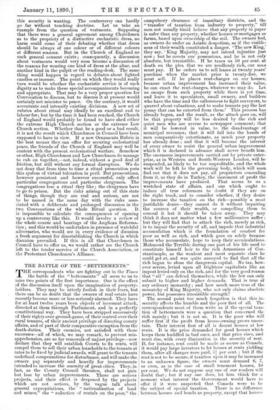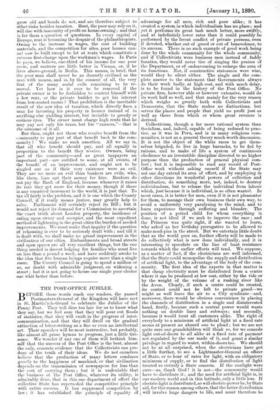THE BATTLE OF THE " BETTERMENTS." T HE correspondents who are
fighting out in the Times the battle of the " betterments " all seem to us to miss two points of the first importance. One is the effect of the discussion itself upon the imagination of property- holders. They may be utterly foolish in their fears, but there can be no doubt that the owners of real estate have recently become more or less seriously alarmed. They have for at least twelve years been objects of incessant attack, directed at them through Parliament, and in a perfectly constitutional way. They have been stripped successively of their rights over ground-game, of their control over their rural tenants, of their ancient privilege of directing county affairs, and of part of their comparative exemption from the death-duties. Their enemies, not satisfied with these successes—all of which, we may remark, to prevent mis- apprehension, are so far removals of unjust privilege—now declare that they will establish Courts to fix rents, will compel them to sell their urban leaseholds to the tenants at rates to be fixed by judicial awards, will grant to the tenants undefined compensations for disturbance, and will make the owners pay separately and heavily for improvements intended to increase the amenity of great cities. They, in fact, as the County Council threaten, shall not gain but lose by urban improvements. These are serious projects, and their effect is deepened by the projects which are not serious, by the vague talk about general expropriations, the " nationalisation of land and mines," the " reduction of rentals on the poor," the , between houses and bonds as property, except that houses compulsory clearance of insanitary districts, and the " transfer of taxation from industry to property," till men not usually timid believe that any property in paper is safer than any property, whether houses or mortgages or farms, based upon ownership of the soil. The owners feel, as owners do under an Asiatic despotism, as if the visible- ness of their wealth constituted a danger. The new King,' they say, King Majority, may not intend injustice just now ; but he covets our possessions, and he is not only absolute, but irresistible. If he taxes us 50 per cent. at death on the plea that we are needlessly rich, our sons must pay. If he orders us to sell leases at twenty years' purchase when the market price is twenty-five, we must sell. If he places rent-charges on our houses, because urban improvement has increased their value, he can exact the rent-charges, whatever we may do. Let us escape from such property while there is yet time, and leave it to speculators, small owners, and builders who have the time and the callousness to fight surveyors, to. quarrel about valuations, and to make tenants pay the last penny that can be extorted from them.' This process has already begun, and the result, as the attack goes on, will be that property will be less desired by the rich and quiet men who are averse to newspaper comment; that it will be lowered in value, to the disadvantage of municipal revenues; that it will fall into the hands of men comparatively extortionate, as much poor property has already done ; and that it will become the interest of every owner to resist the general urban improvement which it is declared in advance shall never benefit him. The enormous improvements carried out by private enter- prise, as in Western and South-Western London, will be suspended, as likely to be too unprofitable, and the whole work will be left to the governing body, which will soon find out that it does not pay, all proprietors concealing from it, as they do in Turkey, the increment of profit the improvements have produced. That seems to us a wretched state of affairs, and one which ought to induce all true reformers to doubt if they are on the right track, and to consider whether, if they desire to increase the taxation on the rich—possibly a most justifiable desire—they cannot do it without impairing the sources of their wealth, or compelling them to conceal it lest it should be taken away. They may think it does not matter what a few millionaires suffer ; but they will find that to attack the rich, merely as rich, is to impair the security of all, and impede that industrial accumulation which is the foundation of comfort for poor as well as rich, and which goes on solely because those who accumulate, hope to keep their accumulations. Mahmoud the Terrible during one part of his life used to constitute himself heir to the rich Armenians of Con- stantinople, as the weakest and most separate class he could get at, and was quite annoyed to find that all the rich began to shun the dangerous capital. No tax, how- ever severe, levied upon all frightens capitalists like an impost levied only on the rich, and for the very good reason that " all " can defend themselves, while the few can only submit to higher and higher demands. That is true of any ordinary monarchy ; and how much more true of the monarchy of King Majority, who not only claims absolute power, but possesses irresistible strength!
The second point too much forgotten is that this in- security affects the humble and the poor first of all. The correspondents most of them write as if the special taxa- tion of betterments were a question that concerned the rich mainly ; but it is not so. It is the poor who will suffer first if the profit from house-owning grows uncer- tain. Their interest first of all is decent houses at low rents. It is the price demanded for good houses which keeps them huddled in bad ones, and that price rises, and must rise, with every diminution in the security of rent. If, for instance, rent could be made as secure as Consols, it would pay large investors to let houses at rents yielding them, after all charges were paid, al per cent. ; but if the rent is not to be secure, if taxation upon it may be increased to an unknown figure, the owners must demand 6, 7, or even, as in the case of small tenement houses, 10 per cent. We do not suppose any one of our readers will doubt that ; but if any one does, let him think for a moment what interest the Government would have to offer if it were suspected that Consols were to be the subject of special taxation. There is no difference grow old and bonds do not, and are therefore subject to other risks besides taxation. Rent, the poor may rely on it, will rise with insecurity of profit on house-owning ; and that is for them a question of questions. In every capital of Europe, rent is becoming the despair of the philanthropists. Owing to the increase in wages, the cost of building materials, and the competition for sites, poor houses can- not now be built except to let at rents which constitute a ruinous first-charge upon the workman's wages. In Paris he pays, we believe, one-third of his income for one poor room, and matters are little better in Vienna, or, if he lives above-ground, in Berlin. This means, in brief, that the poor man shall never be as decently civilised as the man with means, and is, by the consent of all, the very first of the many social evils remaining to be re- moved. Yet how is it ever to be removed if the private owner is to be forbidden to content himself with a low rent, or the private builder to get his interest from low-rented rooms ? That prohibition is the inevitable result of the new idea of taxation, which directly fines a man for investing his property in houses instead of in anything else yielding interest, but invisible to greedy or envious eyes. The owner must charge high rents that he may pay not only his taxes, but his " ransom,"—that is the outcome of it all.
But then, ought not those who receive benefit from the community to pay part of that benefit back to the com- munity ? We make no such assertion. All we say is, that all who benefit should pay, and all equally in proportion to the benefit they receive. Owners, being part of the community—and as great taxpayers an important part —are entitled to some, at all events, of the benefit of an improvement, and ought not to be singled out as if their very existence were an evil. They are no more an evil than bankers are evils, who, like them, loan out their money for hire. Bankers do not pay the Bank of England, because whenever it raises its rate they get more for their money, though if there is any unearned increment in the world, it is just that. To tax all fairly is the.problem, and it is one which the County Council, if it really means justice, may greatly help to solve. Parliament will certainly reject its Bill ; but it would not reject its demand for a Commission to ascertain the exact truth about London property, the incidence of rating upon owner and occupier, and the most expedient method of lightening in the great cities the burden of needed improvements. We must make that inquiry if the question of rehousing is ever to be seriously dealt with ; and till it is dealt with, we shall make no grand improvement in the civilisation of our cities. Embankments and broad streets and open spaces are all very excellent things, but the one thing needed is decent lodging for families who must live on less than a pound a week, and have suddenly awoke to the idea that five human beings require more than a single room. The County Council is going to spend a million or so, no doubt with admirable judgment, on widening a street ; but it is not going to house one single poor elector one whit better than before.







































 Previous page
Previous page